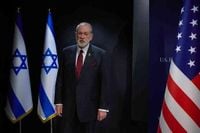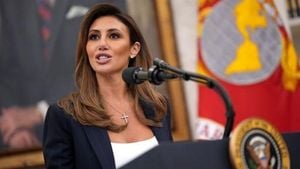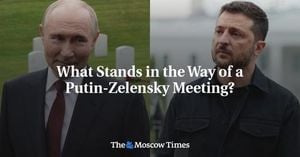U.S. Ambassador to Israel Mike Huckabee has ignited a fresh round of controversy over the faltering Gaza ceasefire talks, pointing a finger squarely at European leaders’ recent decisions to recognize Palestinian statehood. In an interview in Jerusalem on August 20, 2025, Huckabee argued that these moves, far from advancing peace, have actually deepened the divide and made a resolution more elusive.
It’s a claim that has ruffled feathers across capitals. According to the Associated Press, Huckabee stated, “The noise that has been made by European leaders recently ... is having the counterproductive effect that they probably think that they want.” He elaborated, “If they believe that unilaterally calling for a two-state, a Palestinian state recognition, immediately brings them closer, the sad truth is it’s taking them further away.”
The backdrop to Huckabee’s remarks is a conflict that has dragged on for decades, but whose most recent and deadly phase began with Hamas’ attack on Israel on October 7, 2023. The war that followed has seen repeated attempts at ceasefire—most of which have broken down amid mutual recriminations and shifting international alliances.
The latest round of diplomatic drama centers on a wave of announcements by France, Britain, and other Western nations that they would formally recognize a Palestinian state. French President Emmanuel Macron, for example, declared on July 23, 2025, that France would officially recognize Palestine in September—a move that was quickly echoed by other European capitals. These decisions, however, came after the Trump administration’s Middle East envoy had already walked away from the table, frustrated by a lack of progress in the secretive negotiations. The precise moment talks began to unravel remains murky, but what’s clear is that the timing of European announcements has become a flashpoint for blame.
Huckabee’s comments, reported by both the Associated Press and other outlets, underscore a widening rift among Western powers over how to address the Israeli-Palestinian conflict. While many European countries have sought to pressure Israel—viewed as the stronger party—to halt its military campaign and embrace a two-state solution, the Trump administration has thrown its weight behind Israel’s efforts to end the war on its own terms. The White House, as reported by AP, fully supported Israeli Prime Minister Benjamin Netanyahu’s decision to end an earlier ceasefire (brokered with Trump’s help) and resume military operations, even as Israel blocked the entry of food, medicine, and other vital supplies into Gaza for more than two months.
It’s not just talk—there’s action, too. On July 28, 2025, France and Saudi Arabia co-chaired a United Nations conference to promote a two-state solution, a meeting conspicuously boycotted by both Israel and the United States. France used the occasion to reiterate its stance: “There is no alternative to a two-state solution between Israelis and the Palestinians,” French officials said at the UN conference, according to AP. Britain, meanwhile, explicitly linked its recognition of Palestinian statehood to Israeli actions, stating it would hold off if Israel agreed to a ceasefire, stopped settlement expansion in the West Bank, and committed to a two-state solution.
These moves, though largely symbolic, were intended as pressure tactics to force Israel’s hand. But in Israel, the response has been fierce. The current government, along with much of the political class, has long opposed Palestinian statehood, arguing that it would only embolden Hamas and risk a repeat of the October 7 attacks. On August 21, 2025, Israel approved new settlement plans in the E1 area outside Jerusalem—a development that Palestinians say will cut the West Bank in half and make a contiguous state nearly impossible. This is a step that past U.S. administrations, along with Western allies, vehemently opposed, but which has found favor with both Trump and Huckabee.
On the ground, the war’s costs are mounting. Israel’s military campaign, resumed after the collapse of the earlier ceasefire, has blocked humanitarian aid to Gaza for months, drawing condemnation from France, Britain, and over two dozen other nations. These countries have demanded that Israel halt the fighting and do more to facilitate the entry of desperately needed food and medicine. The Associated Press reports that the moves to recognize Palestinian statehood were, in part, a direct response to these humanitarian concerns.
Meanwhile, ceasefire talks have continued—albeit fitfully. This week, Hamas announced it had accepted a proposal from Arab mediators that bore a strong resemblance to one previously advanced by the United States and accepted by Israel. Yet, as of August 21, neither Israel nor the U.S. had formally responded. Huckabee, for his part, remains skeptical of Hamas’ intentions, telling AP he wouldn’t trust the group’s sincerity until they “put their signatures on it,” warning that Hamas could be “stringing this along,” as both the U.S. and Israel have claimed in the past.
The core sticking points remain unchanged. Hamas insists it will only release the remaining hostages in exchange for a lasting ceasefire and a full Israeli withdrawal from Gaza. Israel, on the other hand, demands the unconditional return of all hostages, the defeat and disarmament of Hamas, and the maintenance of security control over Gaza. This deadlock has fueled frustration among ordinary Israelis as well. On August 17, 2025, hundreds of thousands took to the streets—the largest demonstration since October 7—to protest Netanyahu’s planned offensive and call for a hostage-ceasefire deal with Hamas.
Underlying all of this is a deep sense of historical grievance. Most Palestinians, as reported by AP, believe the conflict’s roots lie in Israel’s decades-long military occupation and the continuous expansion of Jewish settlements on land they hope to claim for a future state. Attempts to negotiate a two-state solution have repeatedly collapsed since the early 1990s, and no substantive talks have taken place since Netanyahu returned to office in 2009.
Despite the flurry of diplomatic activity and public demonstrations, the path forward remains deeply uncertain. The Trump administration’s unwavering support for Israel’s military strategy, combined with new settlement approvals and the lack of a unified Western approach, has left the prospects for peace as fragile as ever. The foreign ministries of France and Britain, contacted by the AP for comment on Huckabee’s remarks, did not immediately respond.
As the war drags on and the humanitarian crisis in Gaza deepens, the international community remains sharply divided. While European leaders hope their recognition of Palestinian statehood will pressure Israel toward compromise, critics like Huckabee warn it may only harden positions and prolong the suffering on all sides. For now, the only certainty is that the Israeli-Palestinian conflict—already one of the world’s most intractable—shows no sign of easy resolution.




